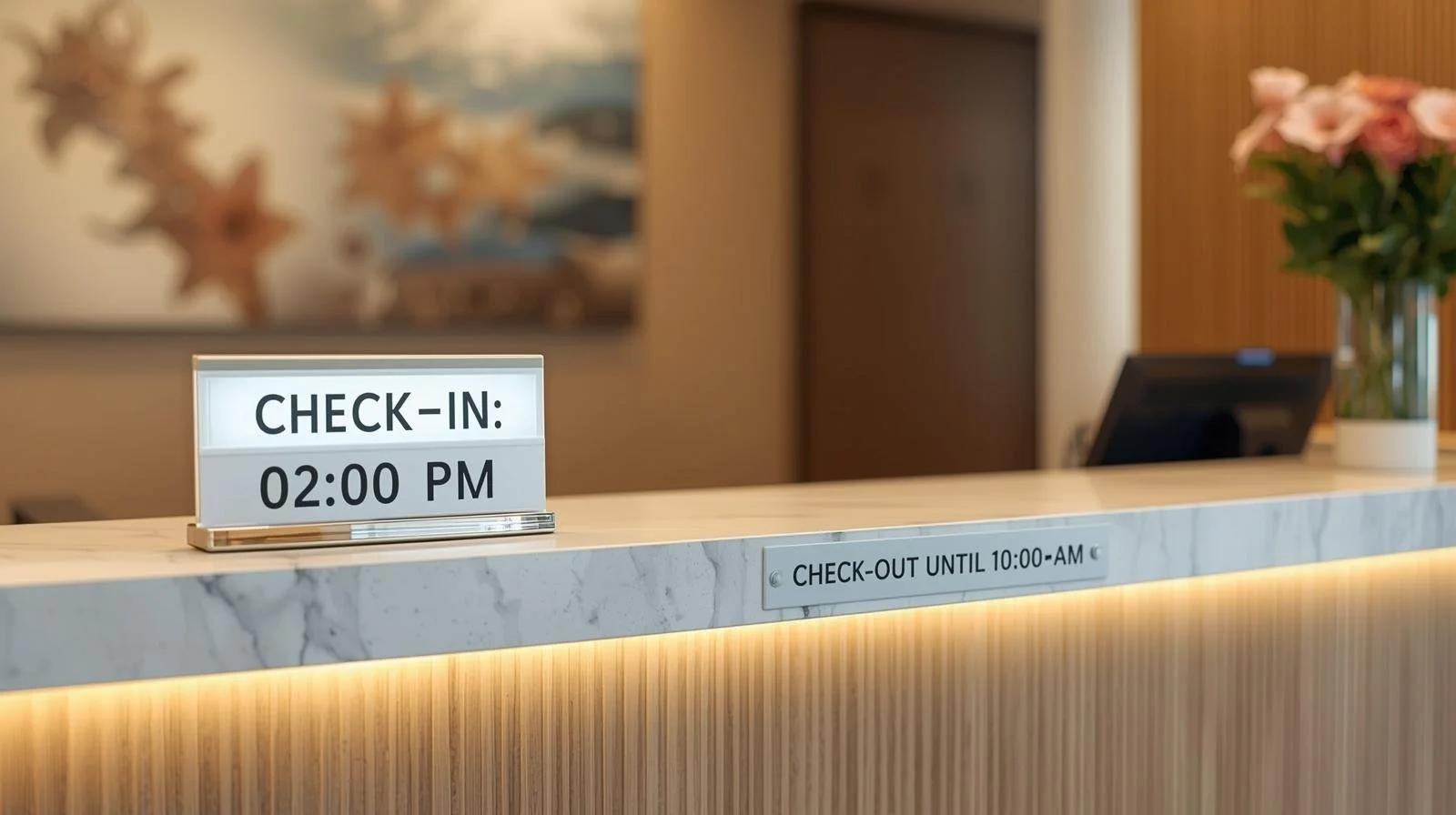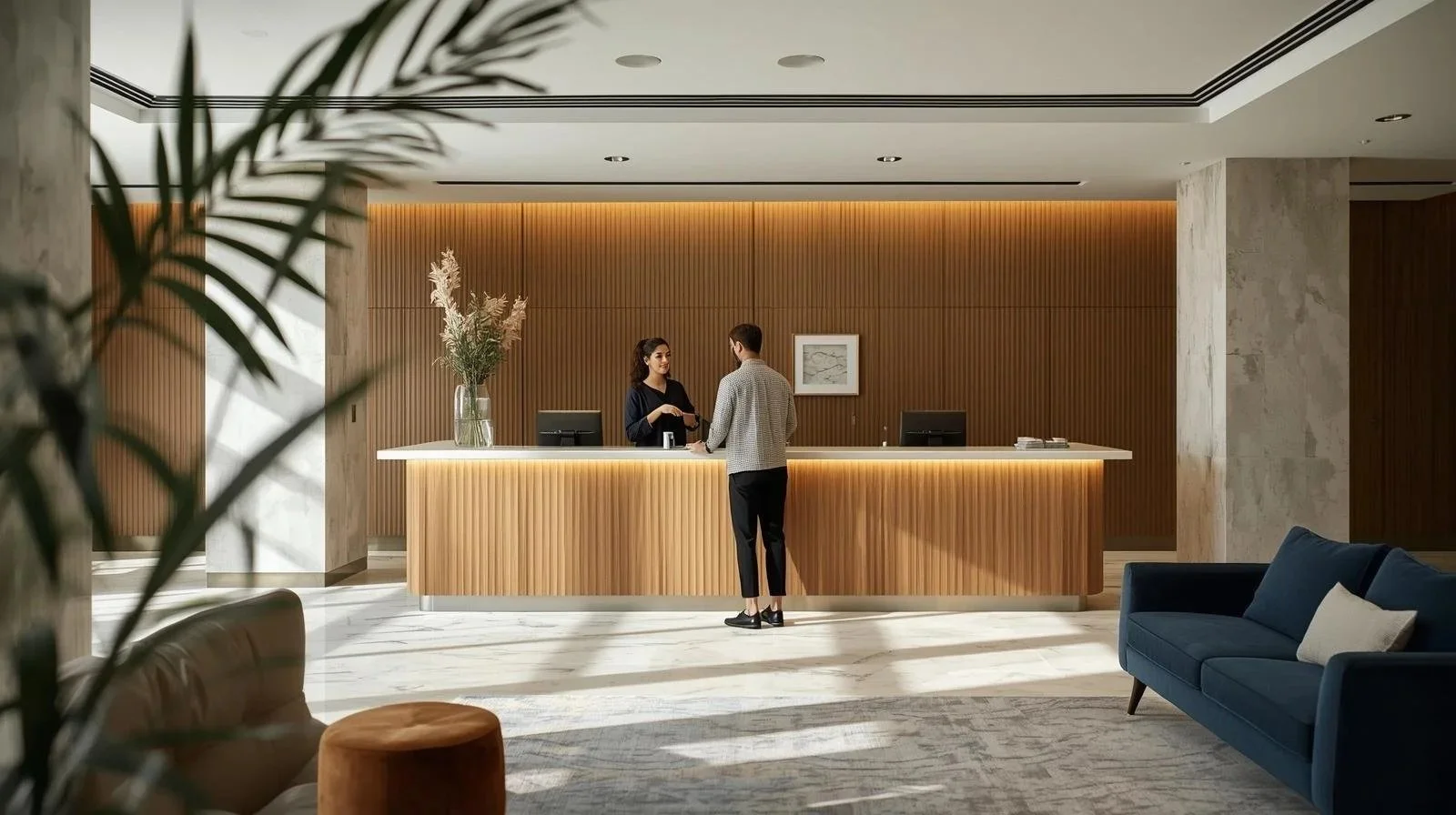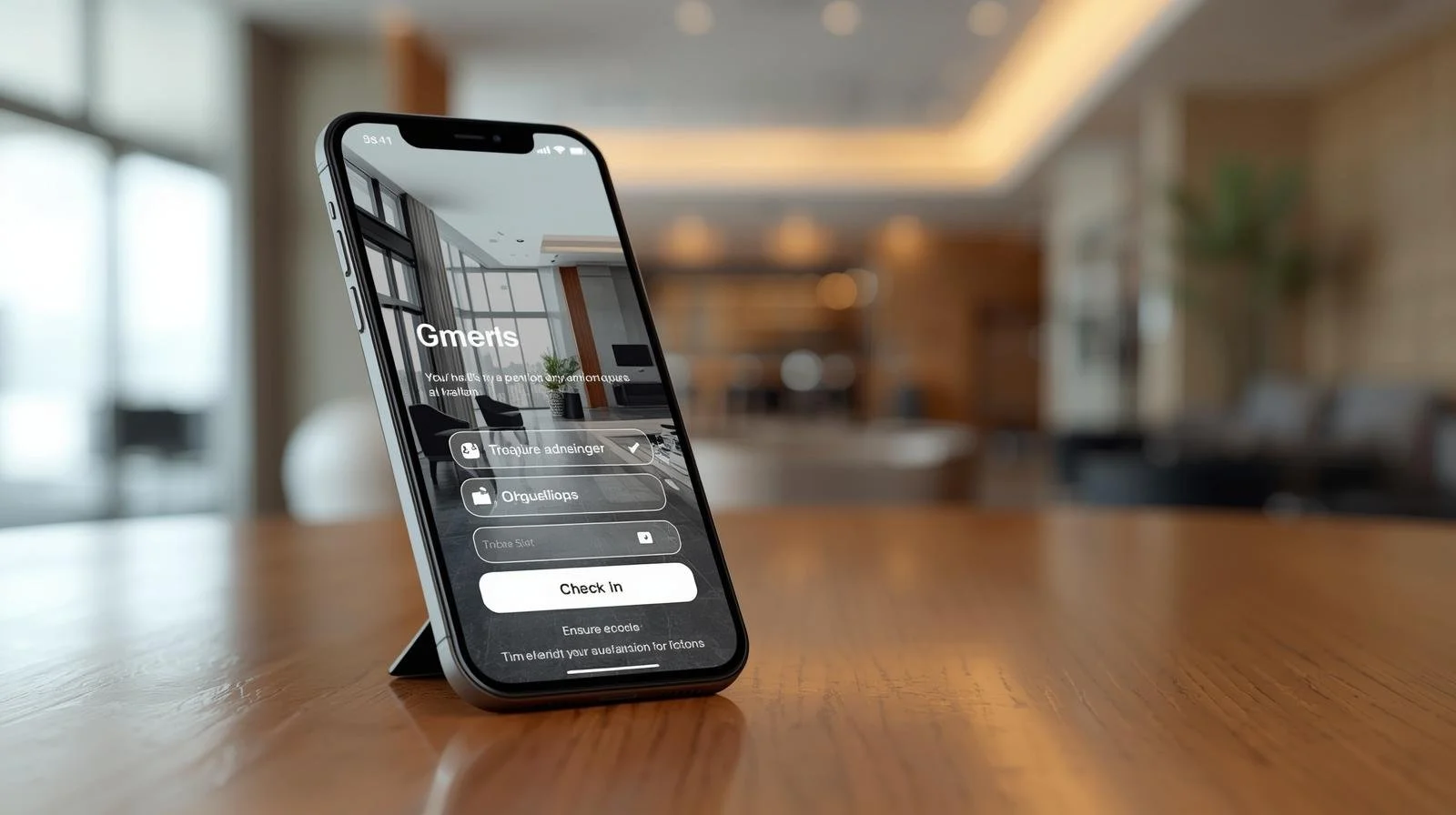How Digital Hotel Check In Times and Check Out Works
Ever heard of hotel check in times and check out?
Actually, every accommodation provider follows certain times when guests have to check in and check out. So it’s worth being well informed about these times of the respective accommodation. If you understand why there is a check in time, how check out works, and above all, what FLEXIPASS Digital Keys has to do with the digital version of that and why there is a general shift from traditional check ins to digital check ins, then your life will become a lot easier.
In this guide, you will learn everything you need to know about it.
Understanding Hotel Check In and Check Out Times
If you’ve ever wondered why hotels actually have strict check in and check out times, then you’re in the right place. Different reasons, such as cleaning, managing guest flow, and other factors, have led to it becoming standard in the hotel industry that check in and check out are only possible at certain times. If you know about these times, you can plan your trip better, which contributes to a more pleasant and smoother stay.
What Are the Standard Check In and Check Out Times in Hospitality
Depending on the region and type of accommodation, the hotel check in times and check out can vary. What is possible for a large hotel or resort does not always correspond to what a small hostel can offer. Nevertheless, certain standard times for check in and check out have emerged over time. In most accommodations, guests can check in from 2:00 PM at the earliest. This helps the accommodation providers ensure room availability, meaning that the rooms are truly ready for occupancy when guests arrive. Check out in most hotels, on the other hand, takes place by a maximum of 10:00–12:00 PM. Outstanding bills can often be settled the evening before, or in resorts, the rest of the day can often still be planned; nevertheless, the rooms must then be vacated by the specified check out time.
It is highly desirable that guests adhere to these schedules, as it helps hotels manage their processes and provide a consistent and positive hotel experience that every guest wants. It’s best to always plan your travel according to the specified check in and check out times.
Why Do Hotels Set Specific Times for Check In and Check Out?
The main reason hotels have fixed times is to increase operational efficiency. This means that fixed check in and checkout times are necessary so that the housekeeping staff can actually do their work. Cleaning a room or apartment can take 2–3 hours, depending on the accommodations standards.
These times also allow reception staff to manage guests properly and in an organized manner. A small gap between departing and arriving guests is necessary to prepare all documents and accommodate any requests. If everything happened at the same time, chaos would probably be inevitable.
In summary, fixed check in and check out times allow hotel staff to do their job well and provide better service; otherwise, without fixed times, the stay would likely be worse for everyone.
Occupancy, Staffing, Guest Preferences and Their Impact on Hotel Check In and Checkout Times
The following three factors can have a major influence on a hotel check in and check out time flexibility:
Occupancy: The more guests there are, the less flexibility there is for hotel check in times and check out. Hotels must adhere more strictly to standard times.
Staffing: The number of housekeeping and reception staff determines how quickly they can clean rooms and prepare them for new guests.
Guest preferences: Hotels have recognized that many people want more flexible check in and check out times; therefore, some hotels try to offer options to satisfy their guests.
To what extent an earlier check in or later check out is possible is discussed in more detail in the following chapters.
Early Arrival and Late Departure: What You Need To Know
Despite fixed hotel check in and check out time, guests can, under certain circumstances, request an earlier arrival (early arrival) or later departure (late departure). Hotels usually try to accommodate guests, and often a solution can be found with or without extra charges. Nevertheless, it is advisable to inform the respective hotel early, so the accommodation can prepare and indicate under which circumstances this is possible.
What Happens If You Arrive Before Check In Time?
If guests arrive unexpectedly before the actual check in time, there are often various options. Either you’re lucky and the booked room is ready earlier than planned, allowing you to already access it. If the room is not yet ready, you can usually store your luggage in the meantime or, if the hotel offers a beach facility or something else, even use it.
So even with an early arrival, there is usually a way to pass the time, albeit with possible extra charges.
Can You Request a Late Check Out or Early Check In?
Yes, you can generally request an extension of your stay at accommodations. However, it cannot automatically be assumed that this is always free of charge, as it exceeds the originally paid stay unless explicitly stated otherwise in the booking policy.
An early check in or late check out differs from early arrival and late departure in that you not only arrive earlier or leave later and possibly store your luggage in the meantime, but that you want to enter the booked room earlier or leave it later. Such requests should always be made in advance, as an extra charge may apply, and it depends on hotel occupancy. An accommodation can often only allow this requests, for example, if the hotel is not fully occupied.
If you as a guest check out later than the specified check out time without prior approval, you should be aware that a fee will most likely apply.
Certain loyalty programs of individual hotel chains even include a late check out free of charge. However, this is by no means standard.
The Shift from Traditional to Digital Hotel Check In and Check Out
Most people imagine hotel check in and check out as entering the hotel and going directly to the staffed reception. There, as a guest, you are first greeted, must present your ID, receive important information about the hotel, such as meal times and Wi Fi passwords, and get your room key. At check out, you go there again, hand over the key, and settle any outstanding bills.
But this is no longer the only or optimal option. Similar to air travel and thanks to new technologies, more and more hotels are offering online check in and check out. This allows accommodations to offer guests either an additional digital option alongside the traditional
option or to handle everything completely digitally and contactless, including with FLEXIPASS Digital Keys.
Accommodations can thus reach a wide audience, relieve reception during peak times, reduce wait times, and meet a variety of guest expectations.
How digital hotel check in times and check out works?
With a digital check in or check out process handled via mobile phone, it is no longer mandatory to appear at the reception at specific times.
So if you book a hotel that offers digital check in and check out, you receive an email link or the option to check in via the hotel app before your arrival. After successful check in, you then receive a Digital Key – either via link or WhatsApp (Webkey), in the app (Mobile Key), or very soon even in your smartphone wallet (Wallet Key).
These Digital Keys are then activated once your room is ready and allow you with your smartphone not only access to your hotel room but also to all other hotel areas for which your key is authorized, such as the main entrance. This way, you can avoid annoying waiting times at the reception upon arrival and go directly to your room.
The same technology is also used for digital or mobile check out. This means you can view your bills digitally – via app or SMS link – check them for accuracy, and pay. Your Digital Key is automatically deactivated once check out time ends or you indicate in the app or digital guest interface that you have left the room or checked out.
This way, you save time on your last day and can end your stay contactlessly and without waiting times, leaving whenever you want. Simple and smooth.
Benefits of Digital Hotel Check In and Check Out
Digital check in and check out have advantages for both guests and accommodation providers. A widespread, unfounded concern of hosts is sometimes that personal contact with guests will be lost through digital check in and check out. However, this usually turns out the opposite, as hotels actually have more time for important guest interactions. Guests are thus given a certain freedom to decide whether they even want to go to the reception, and conversely, reception staff then have more time to handle more important guest requests.
Kristbjorg Johnson, Director of Rooms at The Maven Hotel, shared her experiences with digital check in together with FLEXIPASS Digital Keys:
"Initially, we were worried that with online check in and FLEXIPASS Digital Keys, guests would bypass our front desk completely and head straight to their rooms. But the opposite has actually happened. Guests are now coming to us more often, seeking those extra concierge touches. Thanks to FLEXIPASS, our team now has a couple of extra hours each day to go above and beyond for all of our guests."
Kristbjorg Johnson, Director of Rooms, The Maven Hotel, Sage Hospitality Group (read more about their experience with FLEXIPASS in our Case Study).
Convenience and Speed for Guests & More Time for Hotel Staff
One of the biggest advantages of digital check in and check out systems, together with Digital Keys, is certainly the convenience and speed they offer people:
No queues and relief for the reception: As a guest, you don’t have to wait at the reception to check in or out when it’s busy, saving time. For the hotel, this relieves the front desk staff, and it can focus on more important tasks than redundant check in and check out.
Late check in: Digital check in systems allow guests to arrive even when the hotel reception is no longer staffed. This saves the hotel staffing costs, as the reception doesn’t need to be staffed 24/7, and gives guests enormous flexibility – even checking in at night if necessary.
Immediate access via Digital Keys: Guests receive the Digital Key directly on their smartphone and can open their hotel room door. For the hotel, this means saving costs on key management and replacing broken key cards.
Enhanced Safety & Contactless Key Return
Digital Keys issued with digital check in are usually end to end encrypted (learn more about it in our exclusive whitepaper), so the key only works for the authorized device. Access by unauthorized persons and third parties can thus be avoided, increasing security.
Contactless key return is also a major advantage. The Digital Key is automatically deactivated, and hotel staff do not have to collect, clean, or reset key cards. Moreover, this ensures that rooms are vacated on time and ready for the next guest.
These two advantages improve the guest satisfaction and optimize the hotel’s operational processes.
Conclusion
The hotel industry is changing: hotels are switching from traditional methods to digital check in and check out, bringing more convenience and additional options. Using digital check in systems helps guests save time and provides a secure, contactless way to access their room.
Now that you know how digital check in works and what the usual hotel check in times and check out and methods are, you won’t have any problems. This article clearly shows that digital check in and check out together with Digital Keys make a hotel stay much easier, for guests, but also for hotel staff and management.
Convinced by Digital Keys? Then contact us! We are happy to advise you on how to best integrate our Digital Key solutions into the digital guest experience of your accommodation!




